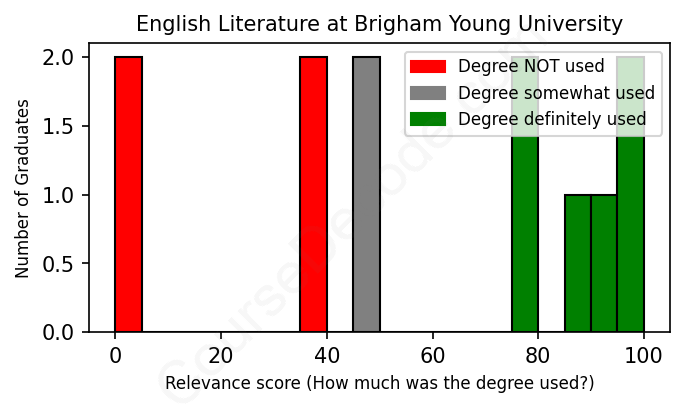
First, some facts. Of the English Literature graduates from Brigham Young University we've analyzed , here's how many have used (or NOT used) their degree in their career:

These are estimates based on AI analysis of 12 LinkedIn profiles (see below).
The verdict? Below average. Overall, with an average relevance score of 58%, English Literature graduates from Brigham Young University have a lower likelihood (-9%) of finding work in this field compared to the average graduate across all fields:
And for comparison, here's the chart for all profiles we've looked at across all degrees.
Also, after graduating, 41% of these graduates have pursued further education other than another Bachelor's degree (such as a Masters degree or other), compared to the average across all profiles of 35%. This suggests you may need more than just a Bachelors degree to be competitive as a English Literature graduate.
See the details:
|
Relevance score: 86% We think this person has gone into a career highly relevant to their degree. We think this person has gone into a career highly relevant to their degree.
DEGREE INFOGraduated in 2020 from Brigham Young University with a Bachelor of Arts - BA in English Literature. Also pursued further education since (see below). JOB HISTORY SINCE GRADUATIONInscape Journal: Non-fiction Literature Critic and Analyst Brigham Young University Sep 2020 - Jan 2021 Data Entry Specialist  Nu Skin Sep 2020 - Apr 2021 Secondary English Teacher  American Preparatory Academy Apr 2021 - Present FURTHER DEGREES DONE SINCE GRADUATINGMaster of Education - MEdWestern Governors University 2021 - 2023 ABOUTI have been a passionate, teachable, and hardworking team player since my adolescence. Currently, I am a BYU graduate with a bachelors in English. I am now pursuing a masters in education at Western Governors University while also working full time as a secondary English teacher. I am a proud Chicano and member of the Church of Jesus Christ of Latter-Day Saints. I am also a proud first-generation college graduate. Education means the world to me because I have seen first hand the unlimited amount of opportunities that come with higher learning. Since graduating with my bachelors, I have become passionate in continuously making my family proud by studying and obtaining the skills necessary to become an effective and impactful educator for the future generations to come. |
The top 10 most common jobs done by the graduates we've analyzed (ranked most common to least) are:
When it comes to jobs for English Literature graduates from Brigham Young University, it looks like there’s quite a mix, but a strong chunk of them have ended up in legal-related roles. Many graduates took on positions like legal assistants, summer interns in law firms, and law clerks. These roles often require the analytical and writing skills that are taught in English Literature programs, such as critical reading and effective communication—so there’s a good connection there. Some even pursued work as editors and copywriters, which are directly aligned with the core skills of writing and textual analysis that one develops while studying literature.
On the flip side, a fair number of graduates have ventured into fields that don’t necessarily relate to their degree. For instance, there are some in healthcare roles like physician assistants, teaching positions, or even in completely different sectors like eCommerce and data analysis—positions where the English Literature background isn’t as useful. Overall, while many grads are using their English skills in relevant ways, others have taken paths that diverge quite a bit from what you might consider a traditional literature career. It really shows how versatile an English degree can be, allowing graduates to step into various industries, even if they don't always apply their literary knowledge directly.
Here is a visual representation of the most common words in job titles for English Literature graduates (this is across all English Literature graduates we've analyzed, not just those who went to Brigham Young University):

When you look at the career trajectories for graduates of English Literature from Brigham Young University, it’s interesting to see a mix of paths, especially in the first few years after graduation. Many of the early careers are concentrated in legal roles, writing, and communications-based positions. For instance, some graduates have started as legal assistants or interns, which suggests that a significant number found a niche within the legal field, using their skills in writing and analysis. Others took on editorial or content-related jobs, showcasing how the degree translates well into creative and communicative roles. It’s a good sign that many grads are landing jobs that are at least somewhat relevant to their English background right away.
Fast forward five or ten years, and the trends get broader. Some have navigated into specialized roles, like copywriting or art direction, indicating that there's potential for career growth and development in more creative domains. However, some graduates ended up in unrelated fields, which might reflect either personal career choices or the realities of job availability in today's market. For instance, there are a couple of grads now working as physician assistants—definitely a leap from English Literature! In summary, while many of these graduates do enter relevant industries and advance their careers over time, it appears that a number have also veered off into different paths. It’s a mixed bag, but overall, it seems like a degree in English Literature from BYU can provide a solid foundation for a variety of careers, even if not all of them stay within that realm.
Honestly, a Bachelor’s degree in English Literature at Brigham Young University, or anywhere else, can be both challenging and rewarding, depending on how you approach it. You’ll be reading a ton of novels, poems, and plays, which can definitely be intense, especially since you’ll need to analyze them deeply and write essays that showcase your critical thinking. Some people find the reading loads manageable, while others struggle with the volume and complexity of the texts. If you're passionate about literature and enjoy discussing themes and exploring different interpretations, you might find it a lot of fun. But if writing papers and diving into dense literary theory doesn’t sound like your jam, it could feel pretty tough at times. Overall, many students consider it more challenging than a lot of other degrees, but it really depends on your interests and strengths!
Most commonly, in the LinkedIn profiles we've looked at, it takes people 6 years to finish a Bachelor degree in English Literature.
It looks like some of these BYU grads are doing pretty well while others are still finding their footing. The law graduates, especially, seem to be on a solid financial path, with positions like Corporate Associate and Immigration Attorney that typically pay well. The folks who got into creative roles like copywriting, editing, and even art direction might not be raking in as much cash, especially starting out, but they could be building valuable skills for future gigs. Some of the more recent grads have roles that suggest they might still be figuring things out, like the secondary English teacher and a produce clerk. Overall, it’s a mixed bag – some have definitely hit the jackpot, while others are still on the climb.
Here is a visual representation of the most common words seen in the "about" section of LinkedIn profiles who have a Bachelor degree in English Literature (this is across all English Literature graduates we've analyzed, not just those who went to Brigham Young University). This may or may not be useful:

Here are all colleges offering a Bachelor degree in English Literature (ordered by the average relevance score of their English Literature graduates, best to worst) where we have analyzed at least 10 of their graduates: